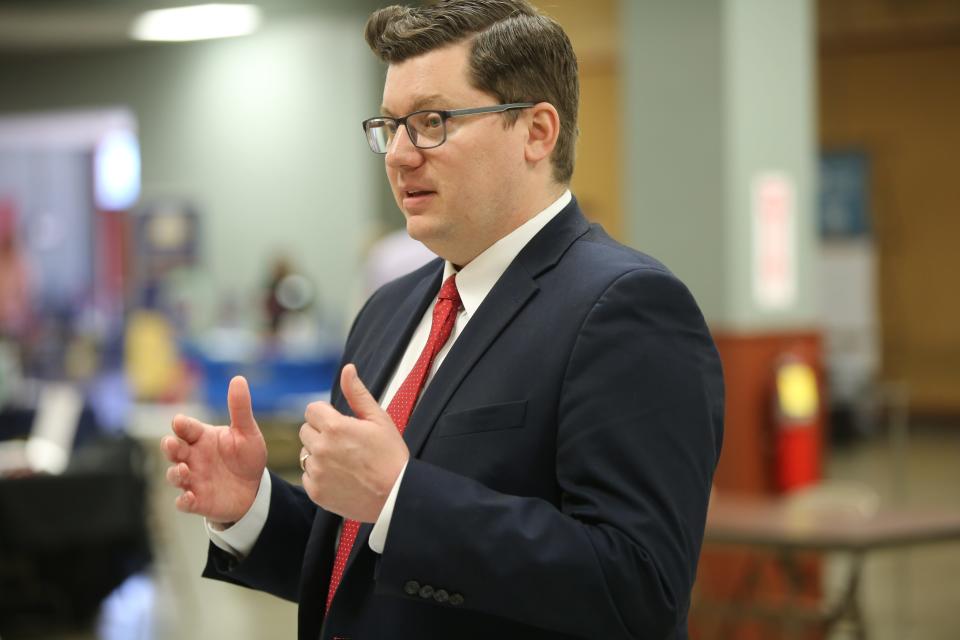Kansas bills that sought protection from Chinese espionage and market manipulation fizzle
- Oops!Something went wrong.Please try again later.
- Oops!Something went wrong.Please try again later.
- Oops!Something went wrong.Please try again later.
- Oops!Something went wrong.Please try again later.
- Oops!Something went wrong.Please try again later.
- Oops!Something went wrong.Please try again later.
Kansas legislators couldn’t pass several of its priorities for national security this session, with bills targeting “countries of concern” failing to overcome Gov. Laura Kelly’s veto.
Though countries of concern includes 12 countries in all habitable continents, an emphasis in these decisions is on China. The Center for Strategic and International Studies documented 224 instances of Chinese espionage directed at the United States government since 2000, which doesn't include such things as espionage on U.S. firms, smuggling operations or the 1,200 intellectual property theft lawsuits U.S. companies filed against Chinese entities.
Members of the Kansas House and Senate passed at least three bills with the motivation of protecting the state from alleged espionage and market manipulation. However, only one bill is going to be law after Kelly's vetoes.

Foreign land ownership
On the last day of the regular legislative session, legislators made one last attempt at limiting the property rights of foreign nationals. Senate Bill 172 would bar any individual from a “country of concern” from owning any nonresidential property within 100 miles of a military base. Only small pockets in western Kansas would be available for citizens of adversarial nations, which includes China, Russia, Iran, Venezuela, Cuba and North Korea.
The bill is retroactive and would force companies or individuals who are citizens of adversarial nations to report themselves to the attorney general within 90 days, which then gives them a year to completely sell their property. The bill came about after U.S. Rep. Jake LaTurner, R-Kansas, asked the Committee on Foreign Investment in the United States to investigate CNano USA, an American subsidiary of a Chinese battery parts manufacturer that is building a $95 million plant in Johnson County.
“The county did not vet that installation, the owners of that company deliberately hid their identity, and only through a series of attempted KORA requests and outrage from the community did we finally find out that they were a Chinese-owned company,” said Sen. Mike Thompson, R-Shawnee.
The buffer between military bases addresses potential espionage, but another motivation of the bill is preventing disruptions to the food chain from foreign nations. But lobbyists representing agricultural producers pushed back on this narrative. Though about 1.2 million acres of Kansas land is owned by foreign nationals, more than 1.1 million of that is used for wind and solar farms.

Critics of the bill in the House and Senate said the bill is unconstitutional, would deter and expel businesses, creates a presumption of guilt on foreign landowners and would cost the state money in inevitable lawsuits.
“With this bill we’re buying not one lawsuit, we’re buying probably dozens of lawsuits that are ultimately going to put our taxpayers on the hook in terms of legal fees,” said Sen. Ethan Corson, D-Prairie Village.
The bill passed both chambers, but without much Democratic support.
“Many of the provisions in House Substitute for Senate Bill 172 are overly broad and not narrowly tailored to enhance our state’s security while limiting the disruption of legitimate investment and business relationships. Additionally, the retroactive nature of this legislation raises further serious constitutional concerns," Kelly said.
She did, however, say that she'd be willing to sign a more "narrow, forward-looking proposal" that doesn't impact legitimate businesses
How did Topeka legislators vote?
Here's how Topeka legislators voted on the foreign land ownership bill:
Yea: Republican Sens. Rick Kloos, Kristen O’Shea; Republican Reps. Jesse Borjon, Ken Corbet and Kyle McNorton.
Nay: Democratic Reps. Kirk Haskins, John Alcala, Vic Miller, Virgil Weigel and Tobias Schlingensiepen.
Present and Passing: Republican Sen. Brenda Dietrich.
Drone bill
Kansas government agencies use unmanned aerial vehicles, or drones, for things like law enforcement, data collection and disaster responses. But China dominates the drone market, making up about 90% of the U.S. consumer market and 70% of the industrial market according to Bloomberg.
Legislators said the intent of House Substitute for Senate Bill 271 is to guard Kansas agencies from Chinese espionage. The United States congress made similar arguments about data access when it force the Chinese company ByteDance to sell the social media app TikTok.
"With drones, we are aware of the capability of drones to transmit data and or video back to a foreign entity, and it may be unbeknownst to the operators, the state agency that has that drone or whether or not that information could be stored in the cloud where it could be hacked," Thompson said.

The bills opponents pointed to the few options available for non-Chinese drones, and the higher cost from domestically made drones. Some also doubted whether China would be able to specifically target Kansas agencies, that information from some Kansas agencies wouldn't be a priority for espionage and that the decision would disrupt agencies maintenance schedule on their drone fleet.
“While the legislation is well-intentioned, it uses overly broad definitions, which will end up placing significant burdens on these government consumers, including law enforcement organizations that depend on drone technology to provide essential services and keep Kansans safe. The legislation requires these consumers to know what goes into each targeted item, down to the individual component, microchip, and processor," Kelly said.
Kelly added that the problem this bill tries to solve could be done during a regular procurement process, and that work is being done to address those concerns.
How did Topeka legislators vote?
Here's how Topeka legislators voted on the drone bill:
Yea: Republican Sens. Rick Kloos, Kristen O'Shea; Republican Reps. Jesse Borjon, Ken Corbet, Kyle McNorton. Democratic Rep. Virgil Weigel.
Nay: Republican Sen. Brenda Dietrich; Democratic Reps. Kirk Haskins, Vic Miller, Tobias Schlingensiepen.
Absent: Democratic Rep. John Alcala
Divestment from KPERS
A provision divesting the Kansas Public Employees Retirement System from countries of concern was bundled into a larger bill that also reforms KPERS increases benefits for employees returning to work after retirement and increases the statutory cap on "alternative investments" — which includes private equity, hedge funds, real property and commodities — from 15% to 25%.
KPERS representatives opposed the divestment from countries of concern, saying that it's primary responsibility is to retirees. At the time of the hearings it had $292 million worth of holdings in China, about $257 million of which were in public market holdings. That's less than 1% of its total trust fund holding. KPERS will have to divest half of that within a year and all of it within two years.
"All investment decisions are made for the sole purpose of providing promised benefits. Adding statutory restrictions to investments impedes the Board of Trustees’ ability to make investment decisions and manage risk with the sole purpose of funding benefits," KPERS executive director Alan Conroy told the House Committee on Financial Institutions and Pensions. "The constraints on KPERS investments could negatively impact the ultimate rate of return which translates into higher KPERS employer contributions by the State and local units of government."

The legislation was supported by State Armor Action and American Global Strategies LLC, who supported the other two bills targeting China this session. The bill passed with veto proof majorities in both the House and Senate, with the five dissenting votes in the House and eight dissenting votes in the Senate largely coming from Republicans.
"While I still have some concerns about the foreign divestment part and, broadly, I don't like telling KPERS what to do, I do think it makes some sense broadly ideologically on not having KPERS money in these countries," said Rep. Rui Xu, R-Westwood.
Kelly allowed the bill to become law without her signature, and gave a less than enthusiastic response in her message after the bill became law.
“While I support efforts to increase focus on national security, I am concerned about the unintended consequences that could be caused by this well-meaning legislation. Therefore, I will allow this bill to become law without my signature,” Kelly said.
How did Topeka legislators vote?
Here's how Topeka legislators voted on the KPERS investment bill:
Yea: Republican Sens. Brenda Dietrich, Rick Kloos, Kristen O’Shea; Republican Reps. Jesse Borjon, Ken Corbet and Kyle McNorton. Democratic Reps. Kirk Haskins, John Alcala, Vic Miller, Virgil Weigel and Tobias Schlingensiepen.
Present and Passing: Republican Sens. Brenda Dietrich, Rick Kloos, Kristen O’Shea; Republican Reps. Jesse Borjon, Ken Corbet and Kyle McNorton; Democratic Reps. Kirk Haskins, John Alcala, Vic Miller, Virgil Weigel and Tobias Schlingensiepen.
This article originally appeared on Topeka Capital-Journal: Kansas bills on NatSec fail to reach overridable majority after veto

